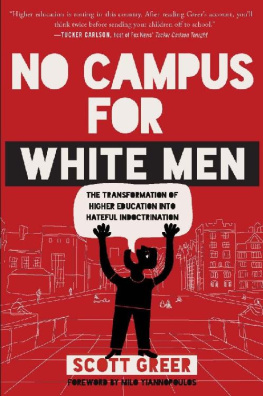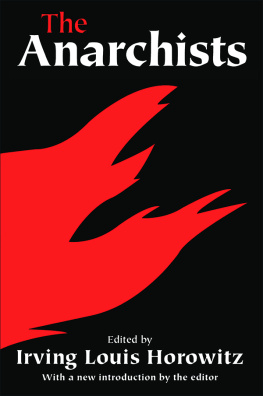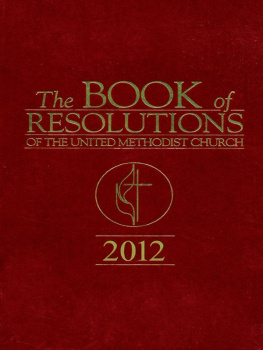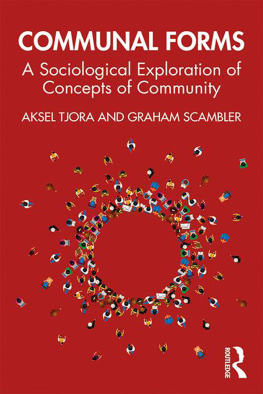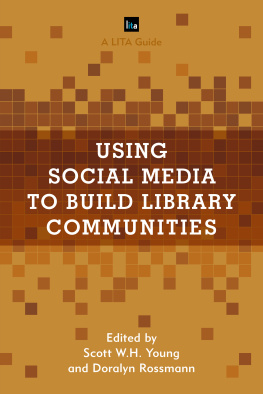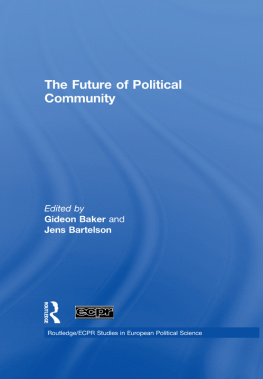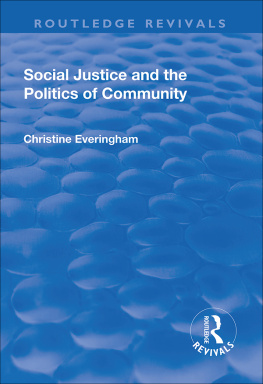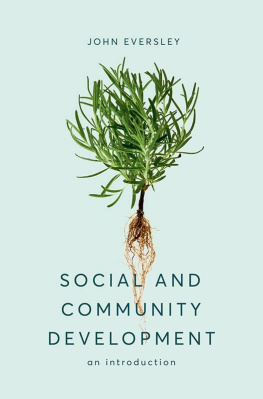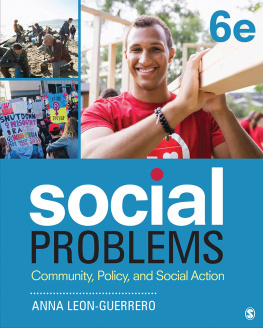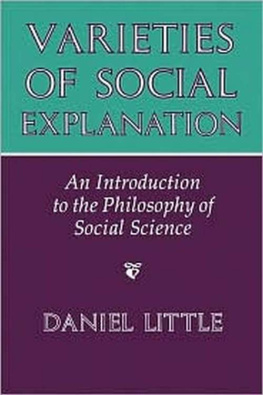First published 1969 by Transaction Publishers
Published 2017 by Routledge
2 Park Square, Milton Park, Abingdon, Oxon OX14 4RN
711 Third Avenue, New York, NY 10017, USA
Routledge is an imprint of the Taylor & Francis Group, an informa business
Copyright 1969 by David W. Minar and Scott Greer.
All rights reserved. No part of this book may be reprinted or reproduced or utilised in any form or by any electronic, mechanical, or other means, now known or hereafter invented, including photocopying and recording, or in any information storage or retrieval system, without permission in writing from the publishers.
Notice:
Product or corporate names may be trademarks or registered trademarks, and are used only for identification and explanation without intent to infringe.
Library of Congress Catalog Number: 2007060656
Library of Congress Cataloging-in-Publication Data
The concept of community : readings with interpretations / David W. Minar and
Scott Greer, editors.
p. cm.
Originally published: Chicago : Aldine 1969.
Includes bibliographical references and index.
ISBN 978-0-202-30962-0 (alk. paper)
1. Communities. I. Minar, David W. II. Greer, Scott A.
HT65.M5 2007
307dc22 |
2007060656
|
ISBN 13: 978-0-202-30962-0 (pbk)
The concept of community is a complex, usually unanalyzed, abstraction. It is often a source of confusion for it stands for many things, and when it is used with interchangeable meanings very elementary errors creep into our discourse. This weakness is true of most germinal notions, and the remedy lies in analysis and discrimination.
Frequently we use community to reter to a physical concentration of individuals in one place. This is the ecological meaning and accordingly a community is simply whatever happens to exist in a given territoryrabbits and coyotes, businessmen and laborers. It means no more than that. There is another connotation of the word, however, which refers to the social organization among a concentration of individuals. And this latter is the source of still another level of meaning.
For community is both empirically descriptive of a social structure and normatively toned. It refers both to the unit of a society as it is and to the aspects of the unit that are valued if they exist, desired in their absence. Community is indivisible from human actions, purposes, and values. It expresses our vague yearnings for a commonality of desire, a communion with those around us, an extension of the bonds of kin and friend to all those who share a common fate with us. Aldous Huxley remarks that D. H. Lawrence was much more unhappy at the lack of real community than he was at the sexual condition of men: community, in this view, is the precondition for the smaller orders and more idiosyncratic values of individuals.
Looking at this double nature of the term, empirically descriptive and normatively prescriptive, leads us to the basic question: What do we want? We may think of a continuum that begins with the Platonic Republic, in which men are socialized and related to one another so that one wants what he gets and gets what he wants. In such an order that which is good to the individual is right to the group. Self-interest and public interest are different aspects of the same morality.
Nineteenth-century economic liberalism is another effort to reach this end, but by what a different route. Its definition of the proper relation of man as individual and collective emphasized his freedom to do what he wished within very broad limits, ignoring the interests of others in the faith that the invisible hand of the market place would allocate values, reward virtue, and punish vices. Individual aggrandizement would result in the greatest good of the collective. This solution to the problem of community resulted in encouraging the entrepreneur and the innovator, at considerable cost to the traditional social values and particularly, the weaker social classes. It produced a world valuing change, individuality, heterogeneity, and individual liberty.
Whatever we want, the next question raised by the normative meaning is strictly empirical: Under what conditions is our desired state of affairs possible? Here we look to the social mechanisms that allow and encourage a society like Platos Republic, or like Natures Half Acre. Historically, we examine specific social structures, from the Athenian polis to Imperial Rome, from the folk society of the Maya to such great world cities as New York, Paris, London. Using sociological concepts, we look at the grounds of community in interdependence, communication, and the ordering of behavior.
Throughout our examination of the concept of community we have found certain recurring antinomies. There is the continual tension between individual interest and the common interest. The Greeks, those idealists of the polis, were forever struggling with brilliant individualists who used the freedom of the community to get their way with it: they never solved the empirical problems their ideals posed.
We also find, as Robert Maclver noted before World War I, a continuing tension between the smaller community and the larger, the part and the whole. Localism is a perennial in the organizational system. Rooted in shared fate, isolation, and intense interaction, interdependence, and communication, units based upon localism are always in tension with those based on nationalism. States fly apart for this reason, national policy is slowed, crippled, and distorted for this reason. At the same time the autonomy of the local community is limited, its own values subordinated to those of the larger society, its very reason for being cast in doubt.
And underlying many discussions of community is the antinomy of stability and change. Perhaps the kind of social unit in which we would have identification with the whole and communion with others is simply one that can persist with very slow rates of change over a long period of time. What one expects and what he gets tend to become fitted in such societies; justice occurs. Perhaps the preliterate societies destroyed by nineteenth century expansionism had invented, after their own fashion, a secular version of Platos Republic, Certainly rapid change has subverted these values.
Change has destroyed the validity of the oldest and in many ways still archetypal form of community, the agricultural village. Created ten thousand years ago during that great creative period we call the Neolithic, it is still the home of most of mankind. But the superior energy sources and power of the urban technological societies everywhere (including nations where a majority still live in the villages), and their expansive tendencies, indicate the obsolescence of the older form.
As this change occurs, another dichotomy is often evoked. From the community of the peasant village to the society of the urban world is a transition from narrow parochialism toward universal ism. As the smaller unit becomes integrated into a large-scale society, our ethnocen- trism declines (or at least is expanded to embrace a nation) and our freedom to act is increased. We lose the comfort, but also the intellectual sterility, of the smaller scene; we gain broader intellectual horizons but also anxiety, and even vertigo, in the great metropolitan societies.


